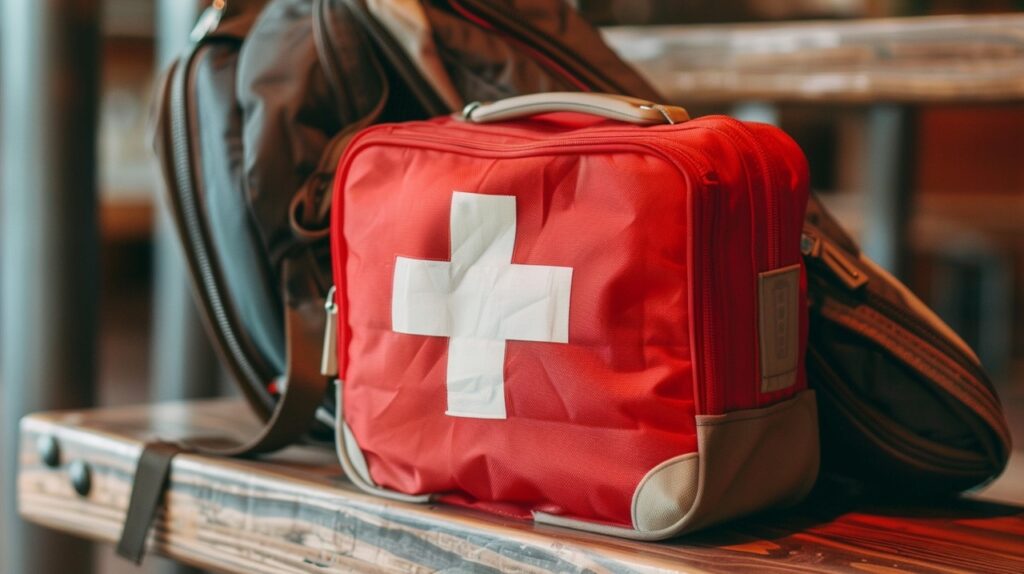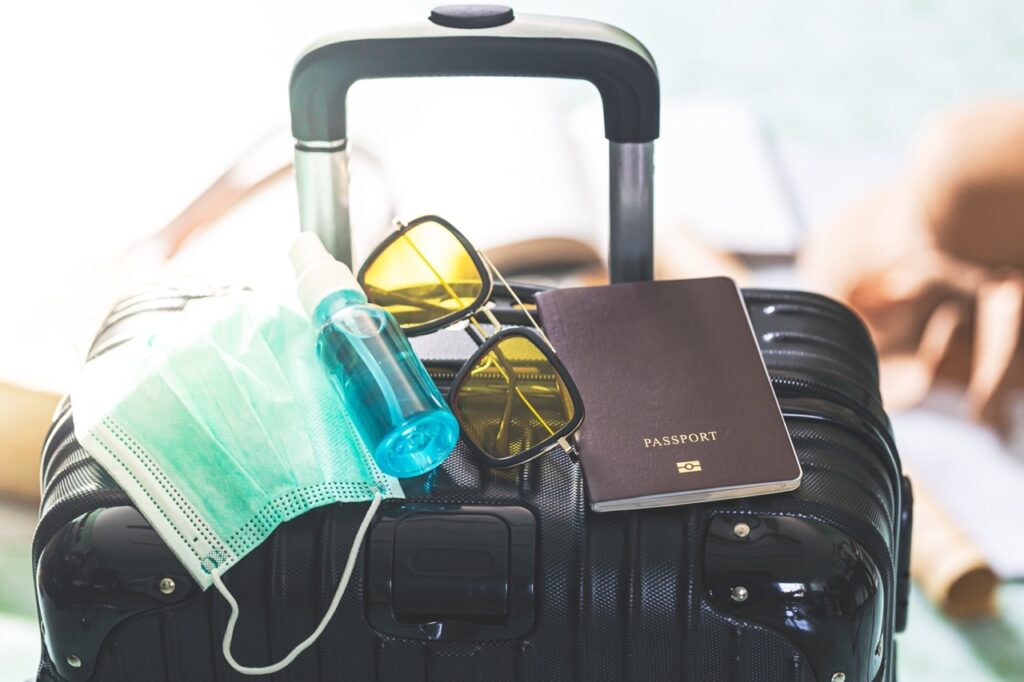June 20, 2025
Traveling with Allergies: Tips for a Symptom-Free Summer Vacation

Summer vacation is here—and it’s time to pack your bags, hit the road, and explore somewhere new. But if you’re one of the millions living with allergies, travel can also mean managing a suitcase full of symptoms. From sneezing fits in new climates to hidden food allergens at unfamiliar restaurants, traveling with allergies takes a little extra planning.
The good news? You don’t have to let allergies hold you back. With the right prep, a few smart strategies, and a compassionate partner like Southern Nevada Allergy in your corner, you can enjoy every minute of your getaway—without the sniffles, swelling, or stress.
Whether you’re headed for the beach, the mountains, or an overseas adventure, this guide will help you travel with confidence and keep allergy symptoms in check. Let’s make this your most refreshing, relaxing summer yet.
Know Before You Go: Research Your Destination
Before you dive into travel mode, take a few minutes to get familiar with your destination’s allergy profile. A little research now can help you avoid a lot of discomfort later.
- Check local pollen and mold levels on sites like Pollen.com or with weather apps that track allergens.
- Look into air quality, especially if you have asthma or other respiratory concerns. High humidity or pollution can make symptoms worse. Websites such as AirNow provide real-time air quality updates, which are crucial for those with respiratory sensitivities.
- Dust mites are a common allergen in hotel rooms. When booking accommodations, consider places that offer hypoallergenic bedding or dust-mite covers to reduce exposure.
- Know where the nearest urgent care or pharmacy is, just in case you need help on the fly.
And of course, if you have moderate to severe allergies, it’s smart to check in with your allergist at Southern Nevada Allergy before you leave. They can help you fine-tune your travel game plan and make sure your medications are up to date.

Pack Your Allergy Toolkit
You’ve got the sunscreen and swimwear covered—now let’s make sure you’re just as prepared for allergens on the move.
Here’s what to stash in your carry-on luggage or glove box:
- Pack two clearly labeled epinephrine auto-injectors, plus your daily medications and inhalers, in an easy-to-access spot.
- Daily meds (plus a few extras, just in case)
- A doctor’s note or allergy card if you’re traveling internationally
- Bring your own supplies such as hypoallergenic pillowcases, mattress covers, and toiletries to minimize allergen exposure
- Pack wipes for cleaning surfaces and removing allergens, plus hand sanitizer
- Portable air purifier or fan
- Allergy-safe snacks you trust
Even if you never need these things, having them on hand gives you peace of mind—which makes for a much more relaxing trip.

Navigating Airport Security with Allergies
Airport security can be stressful, but a little preparation makes it much smoother for travelers with allergies. Before you reach the checkpoint, let security staff know about your allergies and any medications you’re carrying, such as epinephrine auto injectors or other auto injectors. Keep all your medications in your carry on bag, and make sure they’re clearly labeled with a prescription or doctor’s note if needed.
To make things even easier, consider wearing a medical alert necklace or carrying a medical alert card that lists your allergies. This helps airport security and airline staff quickly understand your needs in case of an emergency. And remember, always keep your medications easily accessible in your carry on bag—never in checked luggage—so you’re prepared for any situation.
Navigate Dining Like a Pro
Trying new foods is part of the fun of traveling—but not if you’re worried about hidden ingredients.
Make meals safer and less stressful with these simple steps:
- Research restaurants ahead of time and read reviews from others with food allergies.
- Call ahead to ask about ingredients and prep methods.
- Avoid buffets, where cross-contamination is common.
- Carry a printed allergy card that lists your allergens in the local language—essential for international travel and dining out with confidence.
When in doubt, stick to whole, simple foods you know are safe, and always keep your rescue meds within reach.
Plane or Car? Be Allergy Aware
Whether you’re taking off or hitting the open road, travel brings its own set of allergy triggers.
If you’re flying:
- Air travel requires taking precautions to ensure your safety and comfort. Let the airline know about your allergies when booking, as many airlines offer allergy-friendly meal options and accommodations if informed ahead of time.
- If you have pet allergies, request pet-free seating or notify the airline in advance.
- Wipe down your seat area—especially high-touch surfaces like the tray table, belts, and armrests—to clean surfaces and remove allergens such as food residue and pet dander.
- Consider wearing a mask to limit exposure to airborne irritants and pet dander.
- Pack your own snacks and drinks.
- Be prepared for a possible allergic reaction by carrying necessary medications, such as epinephrine auto-injectors, during air travel.
- Flight attendants can assist with allergy-friendly meals and accommodations if notified in advance.
If you’re road-tripping:
- Give your car a good vacuum and wipe-down before you leave.
- Keep windows closed and use a clean air filter.
- Map out allergy-friendly stops in advance.
You might not control the environment completely—but you can make small changes that keep things manageable.

Sleep Smart: Hotel Tips for Allergy Friendly Rooms
Your home away from home should help you recharge—not trigger your symptoms.
Here’s how to sleep easy:
- Ask for a pet-free, smoke-free, or hypoallergenic room when booking.
- Request allergy friendly rooms, which may include air purifiers, hypoallergenic bedding, and hard-surface floors to reduce allergen exposure.
- Let the hotel know about your allergies ahead of time.
- Bring along a travel pillowcase or allergy blanket if you’re sensitive.
- Keep your room tidy and avoid leaving windows open overnight.
For more guidance on finding allergy-friendly accommodations, consult trusted sources like the allergy foundation. The anaphylaxis alliance also offers expert advice on managing severe allergies and finding safe hotel options.
You can also pack a small air purifier or fan if you’re extra sensitive to dust or stale air.
Stay On Track While On the Go
Once you’re in vacation mode, it’s easy to forget your usual allergy routine—but staying consistent is key to keeping symptoms in check.
Here’s how to stay ahead of allergies, even on the move:
- Stick to your medication schedule, even if you’re feeling fine.
- Monitor pollen and air quality with real-time apps so you can plan your outdoor time wisely.
- Avoid high-pollen hours, typically early morning and late afternoon.
- Shower and change clothes after being outside to avoid tracking pollen indoors.
- Choose accommodations with HEPA filters or air conditioning to help maintain clean indoor air.
- Drink plenty of water to stay hydrated and help flush out allergens.
- Keep masks and saline spray on hand for added protection, especially in dry or dusty environments.
Just a few simple habits can make a big difference in how you feel—so you can focus more on fun, and less on flare-ups.
Tips for Traveling with Kids with Allergies
If you’re a parent of a child with allergies, you already know how important planning is. Travel just adds an extra layer.
- Teach your child how to talk about their allergies in a way that’s age-appropriate.
- Label and organize all medications clearly and keep them within reach.
- Pack familiar, safe snacks to reduce risk and stress.
- Communicate with caregivers or anyone who might be supervising your child during the trip.
- Have a family member assist with declaring or handling medications and supporting your child during airport security or travel.
A written allergy action plan is always a smart move—and a great confidence booster for everyone involved.

Allergy-Safe Travel Checklist
A little preparation goes a long way when it comes to traveling with allergies. Use this checklist to make sure you’re ready for anything:
- Research your destination’s pollen forecast and look for allergy-friendly accommodations.
- Pack all essential medications, including epinephrine auto injectors, antihistamines, and any other allergy medications you rely on.
- Bring a saline nasal spray to help clear allergens from your nose, and pack allergy-friendly wipes for cleaning surfaces like tray tables and hotel room counters.
- Wear a mask outdoors if pollen counts are high, and keep your medications and auto injectors in your carry on bag for easy access.
- Double-check that you have all your documentation, such as a doctor’s note or allergy card, especially if you’re traveling internationally.
With these essentials in your bag, you’ll be ready to handle allergens and enjoy a safe, symptom-free trip wherever you go!
Your Symptom-Free Summer Starts Here
Traveling with allergies doesn’t have to mean constant worry. With a little prep and the right support, you can soak up the fun, the sun, and the memories—without the flare-ups.
At Southern Nevada Allergy, we’re here to make sure your trip starts on the right foot. Our compassionate team is ready to help you feel confident, prepared, and in control—wherever your summer takes you.
Here’s how to get started:
- Schedule a travel prep consultation with your allergist.
- Check out Our Travel Essentials Checklist: Ensure you have all necessary items packed.
- Sign up for our newsletter for even more allergy-smart tips.
This summer, let the only thing you bring back be souvenirs—not symptoms. Safe travels!